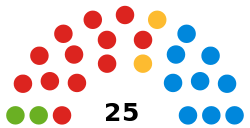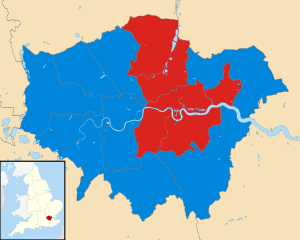London Assembly
| London Assembly | |
|---|---|
|
| |
| Type | |
| Type |
Unicameral |
| Leadership | |
|
Roger Evans AM, Conservatives | |
| Structure | |
| Seats | 25 Assembly Members |
 | |
| Committees |
|
|
12 / 25 | |
|
9 / 25 | |
|
2 / 25 | |
|
2 / 25 | |
| Elections | |
| Additional Member System | |
Last election | 3 May 2012 |
Next election | 5 May 2016 |
| Meeting place | |
 | |
|
City Hall Southwark, Greater London United Kingdom | |
| Website | |
| www.london.gov.uk | |
| This article is part of a series on the politics and government of London |
|
|
| British politics portal |
The London Assembly is an elected body, part of the Greater London Authority, that scrutinises the activities of the Mayor of London and has the power, with a two-thirds majority, to amend the Mayor's annual budget and to reject the Mayor's draft statutory strategies.[1] The Assembly was established in 2000 and is headquartered at City Hall on the South Bank of the River Thames, close to Tower Bridge. The Assembly is also able to investigate other issues of importance to Londoners (transport, environmental matters, etc.), publish its findings and recommendations, and make proposals to the Mayor.
Assembly Members
The Assembly comprises 25 members elected using the Additional Member System of proportional representation. Elections take place every four years - at the same time as for the Mayor. There are 14 constituencies each electing one member, with a further 11 members elected from a party list to make the total members from each party proportional to the votes cast for that party across the whole of London using modified D'Hondt.[2] A party must win at least 5% of the party list vote in order to win any seats. Members of the Assembly have the post-nominal title 'AM'. The annual salary for a London Assembly member is approximately £55,000.[3] The current chair of the London Assembly is Roger Evans, Conservative member for Havering and Redbridge.
Since its creation in 2000, nine Assembly Members have subsequently been elected to the House of Commons: David Lammy, Meg Hillier and Diana Johnson for Labour; Andrew Pelling, Bob Neill, Angie Bray, Bob Blackman and Eric Ollerenshaw for the Conservatives; and Lynne Featherstone for the Liberal Democrats. In addition, Val Shawcross, Assembly Member for Lambeth and Southwark was selected, but unsuccessful, as the Labour parliamentary candidate for the constituency of Bermondsey and Old Southwark. Andrew Dismore and Richard Tracey are both former MPs who were later elected to the Assembly.
Structure of the Assembly
| Political party | Assembly Members | Current members | |||||||||||||||
|---|---|---|---|---|---|---|---|---|---|---|---|---|---|---|---|---|---|
| 2000 | 2004 | 2008 | 2012 | ||||||||||||||
| Labour | 9 | 7 | 8 | 12 | |||||||||||||
| Conservative | 9 | 9 | 11 | 9 | |||||||||||||
| Green | 3 | 2 | 2 | 2 | |||||||||||||
| Liberal Democrat | 4 | 5 | 3 | 2 | |||||||||||||
| UKIP | - | 2 | - | - | |||||||||||||
| BNP | - | - | 1 | - | |||||||||||||

Constituency members
London-wide members
| Party | ||
|---|---|---|
| Members | ||
| Labour | Nicky Gavron, Murad Qureshi, Fiona Twycross, Tom Copley | |
| Conservative | Andrew Boff, Gareth Bacon, Victoria Borwick | |
| Liberal Democrat | Caroline Pidgeon, Stephen Knight | |
| Green | Jenny Jones, Darren Johnson |
Chair
- Roger Evans (2013-present)
- Jennette Arnold (2012-2013)
- Dee Doocey (2010-2011)
- Darren Johnson (2009-2010)
Committees
The London Assembly is required to form a Police and Crime Panel by the Police Reform and Social Responsibility Act 2011 in order to scrutinise the Mayor's Office for Policing and Crime.[4]
Result maps
-

2000 results
-

2004 results
-

2008 results
-

2012 results
See also
- London Assembly election, 2000
- London Assembly election, 2004
- London Assembly election, 2008
- London Assembly election, 2012
- London Assembly election, 2016
References
- ↑ "Localism Act 2011". Legislation.gov.uk. 2012-02-07. Retrieved 2015-04-03.
- ↑ "BBC News - How the London election works". Bbc.co.uk. 25 April 2012. Retrieved 18 November 2012.
- ↑ "London Assembly Members". The London Assembly. Mayor of London, the London Assembly and the Greater London Authority.
- ↑ "Police Reform and Social Responsibility Act 2011". Legislation.gov.uk. 2011-10-26. Retrieved 2015-01-29.
External links
- London Assembly
- London Assembly publications
- London Assembly Liberal Democrats
- London Assembly Labour
- GLA Conservatives
| ||||||||||||||||||||||||
| ||||||||||||||||||||||